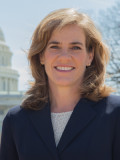 By General Counsel K. Hollyn Hollman
By General Counsel K. Hollyn Hollman
Through our publications, blog, and website, the BJC regularly reports on state legislative action affecting religious liberty. Some of the most visible recent bills are state versions of the federal Religious Freedom Restoration Act (RFRA). The BJC supports strong statutory protections for free exercise rights modeled on the federal RFRA and frequently writes about how these state bills respond to legal and political developments (see BJConline.org/RFRA). Debates over the bills vary depending on the specific language of the legislation and the political environment in which they are proposed.
While the BJC continues to track these bills and advocate for ways to protect religious freedom for all, we also learn from these state legislative experiments. Recent developments in one state deserve special notice. While Utah did not pass a state RFRA, it passed two significant bills that have been dubbed the “Utah Compromise,” providing protections for both religious liberty and the LGBT community. Utah’s actions appear to demonstrate that conflicts about the meaning of religious liberty, the scope of religious exemptions and the rights of LGBT persons can be worked through and lead to mutually beneficial results.
In several states that have recently considered or passed religious freedom legislation, debate has focused on how the law will affect LGBT persons and those who have religious objections to LGBT legal protections. Individuals for and against specific measures, including politicians, business leaders and religious liberty advocates, mostly have been talking past each other’s concerns. Honest assessments have been hard to find.
In Utah, the interested parties found a way to work together. The “Utah Compromise” consists of two pieces of legislation referred to by their Senate bill numbers: SB 296 and SB 297.
SB 296 adds “sexual orientation” and “gender identity” as protected classes in Utah’s housing and employment statutes and protects certain employee speech. SB 297 respects religious objections to involvement in same-sex marriage while ensuring that all couples have access to marriage.
Previously, religious groups in Utah were exempt from all anti-discrimination provisions in Utah’s housing and employment statutes and no anti-discrimination protections were in place for members of the LGBT community. The change in law means that, while religious groups remain exempt from all anti-discrimination provisions, the Utah LGBT community will have the same protections in housing and employment as members of other protected classes, such as race, sex, religion and disability. Additionally, employees are now specifically protected from employer retaliation for expressing “religious or moral beliefs and commitments in the workplace in a reasonable, non-disruptive, and non-harassing way” and “for lawful expression or expressive activity outside of the workplace regarding the person’s religious, political, or personal convictions.”
Historically, Utah law did not impose a duty upon county clerks to perform marriage ceremonies. Therefore, some county clerks solemnized marriages while others did not. After the recent changes in law, each county clerk’s office must develop policies not only to issue marriage licenses but also solemnize all legal marriages. Clerks who object to performing wedding ceremonies must appoint someone in the county to do so. This decision is not on a couple-by-couple basis; clerks will be available to perform any legal marriage ceremony or have an appointed alternate to do so.
For several reasons, including the way Utah’s prior non-discrimination provisions were written, the prominence of the Church of Jesus Christ of Latter-day Saints in Utah, and the need to heal deep divisions between the LDS Church and the LGBT community from earlier political fights, advocates say the legislation won’t be a model for other states. But, according to Jonathan Rauch, a senior fellow at the Brookings Institution, which sponsored an excellent program on the issue, it may be a “pathway.” The Brookings program, “Gays, Mormons, and the Constitution: Are there win-win answers for LGBT rights and religious conscience?” was held March 16, and a recording is available on their website.
It appears many in Utah did the hard work of listening, explaining, writing and compromising, so that different groups could get things they needed. If Utah is a pathway for other states, it will be because those who care about statutory protections for religious liberty work diligently and honestly to explain what and why legislation is needed and how others will be affected. That is an example worth following.
From the April 2015 Report from the Capital. Click here to read the next article.
Click here to view the entire issue as a PDF document.





